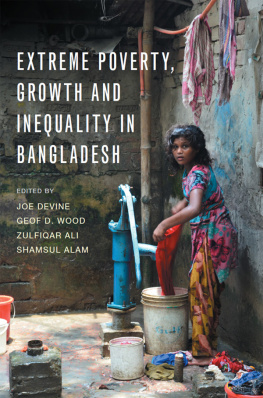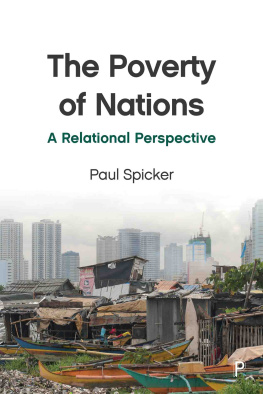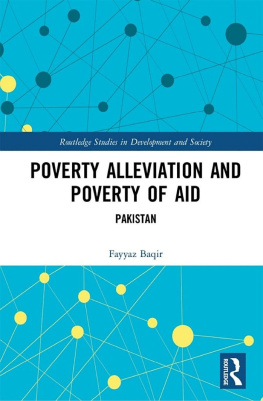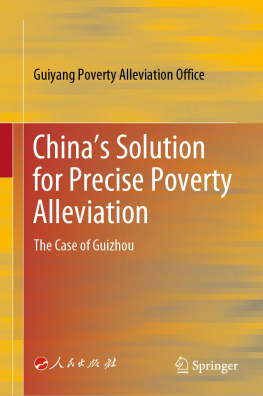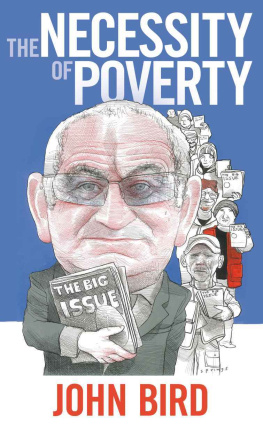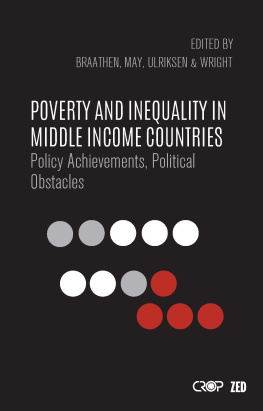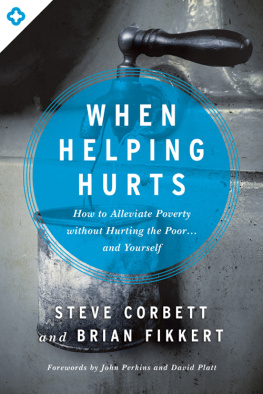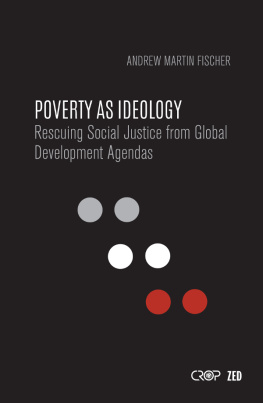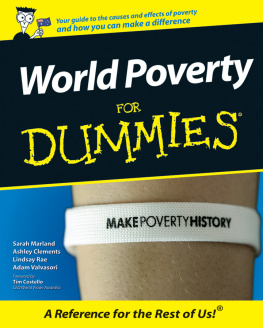Introduction
Life isnt fair. This is especially true for the worlds poorest. But why isnt life fair and what, specifically, contributes to it being so unfair when you are living in extreme poverty?
When I first considered trying to tackle the topic of poverty, I was overwhelmed by the amount of information already available. Decades of research, millions of organizations dedicated to the cause, and people with more advanced degrees than mine who were senior advisers for governments, nonprofits, or think tanks already existed. When I typed poverty into my universitys library catalog, over sixty thousand results popped up.
At first, my business-focused brain believed my curiosity was new, but as I reflected on my shifting interests over the years, I realized conducting a self-guided deep dive into poverty alleviation was not as random as it seemed. From the third grade, when I developed far-fetched aspirations of becoming the governor of my state, I had an interest in understanding individuals problems and finding solutions.
However, I knew I could not possibly be the only student curious about wealth inequality. I knew as a low-income student at an elite university, I felt uncomfortably aware of the stark disparities between income levels every time I walked around my historic campus grounds. I knew extreme poverty in a world with over two thousand billionaires just didnt add up.
As I continued to research and interview experts at nonprofits, I gained both clarity about the topic and hope for the future. Humanity is closer than it has ever been before to eradicating extreme poverty. From 1990 to today, over one billion people have escaped extreme poverty. Unfortunately, todays dominating poverty framework utilizes policies with serious side effects:
Giving money for relief becomes crushing debt.
Inserting outsiders with donor government interests at heart into local communities is morally complex.
Promoting short-term volunteer projects doesnt provide long-term sustainability.
Supporting unequal concentrations of power in government and business has become more harmful than good.
These flawed policies are part of the reason why we havent seen the solution to poverty; because as thousands of people escape extreme poverty every day, thousands of others fall into it as well.
A Story of Hope
In May 2017, Davis Nguyen shared a TED Talk called Solving Poverty Without a Big Wallet about a backpacking trip he took after graduating university. He traveled around some of the worlds poorest villages, which led him to Sapa, a mountain region between China and Vietnam. There he met a woman named Zer-Zer who had lived in Sapa her entire life and sold homemade goods to make a living. Without ever entering a classroom, she managed to teach herself four languages. Davis described her as a woman who loved people, culture, and language.
Both she and her children woke up at 5 a.m. every single day to sell their homemade goods to tourists in the city center. The journey from their home to the city center was three hours long. When they sold goods successfully, they managed to afford food to eat. When they didnt, they had to depend on the leftoversif there were any at allfrom their successful sales days. Davis wanted to help Zer-Zer, but he knew just giving her money would not be the kind of long-term help she deserved. When the money ran out, so too would his impact.
While he lived in Sapa, Davis and his friends noticed one of the most lucrative ways to make a living is by giving tours. They knew Zer-Zers language skills, coupled with her local knowledge, would make her an incredible tour guide. The major problem she faced was being unable to read and write in English, despite speaking it fluently. To help her support her family, they made flyers for her to promote what would develop into a small tour business. Within one day, Zer-Zer made more than the average Mung family makes in two months.
What Davis and his friends did for Zer-Zer is an excellent example of how new poverty alleviation systems should be built: through partnerships. Partnerships uplift and empower rather than refuse or discourage. Partnerships put knowledge in the hands of those who need a chance to help themselves.
More Than Money
There are over six hundred million people living in extreme poverty globallythe World Bank defines extreme poverty as living on less than US$1.90 per day. While most well-intentioned people believe giving away more money, advocating for handouts, sharing hashtags, or writing lengthy posts for popular social movements are the best ways to address poverty, these methods are not enough.
In fact, as of 2017, the US State Department and USAID provided a total of US$50.1 billion in foreign aid around the world, and yet poverty in Sub-Saharan Africa has increased since 2016.
Throwing money at poverty isnt working because money is one solution to this complex, global problem. In the short run, money pays bills, covers the cost of necessities, and relieves financial pressure. In the long run, money doesnt address structural oppression built into society, teach people how to advocate for themselves, or empower anyone through skills and knowledge. Using only money to eradicate poverty is like putting a band-aid over a protruding, broken bone. The blood isnt the only problem.
To eradicate extreme poverty, we need to advocate for Money Plus solutions. These solutions not only provide money to low-income communities, but also address core dimensions of life and help lift people out of poverty, such as:
Supporting agriculture and providing access to nutritious foods
Decreasing child mortality rates
Increasing school attendance for all genders
Fighting for the rights and ownership of assets like homes and land
Improving living standards by providing regular and dependable access to necessities like water, electricity, and healthcare
To support this effort, we also need to challenge the current state of society, specifically related to social, political, and economic factors determining the kinds of opportunities made available to people living in poverty.
Over six hundred million people globally are being excluded from opportunities provided to middle- and upper-class populations, consistently denied representation in governance and policymaking, disproportionately affected by human rights violations, and discriminated against without major defense because they cant pay for expensive lawyers.
The US$175 billion per year wont end poverty instantaneously, which means we have time to approach this from a new, well-informed angle. Choosing to take the longer, harder route means we will be able to address and understand the root causes and complex dynamics of extreme poverty.


